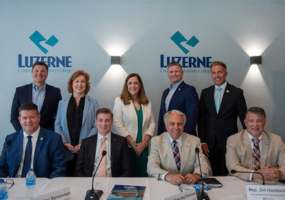 The Pennsylvania Chamber of Business and Industry recently hosted a bipartisan Government Affairs Roundtable at Luzerne County Community College (LCCC), bringing together local legislators and leaders from labor, education, and the energy sectors to explore Pennsylvania’s potential to lead the nation in data center development, energy production, and workforce advancement.
The Pennsylvania Chamber of Business and Industry recently hosted a bipartisan Government Affairs Roundtable at Luzerne County Community College (LCCC), bringing together local legislators and leaders from labor, education, and the energy sectors to explore Pennsylvania’s potential to lead the nation in data center development, energy production, and workforce advancement.
Featured speakers included PA Chamber President and CEO Luke Bernstein, Greater Wyoming Valley Chamber President Lindsay Griffin-Boylan, LCCC President John Yudichak, state Senators Lisa Baker, Lynda Culver, and David Argall, and state Representatives Alec Ryncavage, Dane Watro, Eddie Day Pashinski, Jim Haddock, and Jamie Walsh.
Workforce development emerged as a central theme of the event, with community colleges—especially LCCC—recognized for their role in preparing students for careers in the trades and emerging technologies. Participants emphasized the need to align education and training programs with practical industry demands.
Senator Lynda Culver highlighted the importance of early childhood education, noting that only 33 percent of third graders are reading proficiently. She advocated for increased investment in literacy and soft skills. This priority aligns with the PA Chamber’s Keystone Initiative, a member-driven, long-range economic blueprint that identifies third-grade reading proficiency as a key predictor of long-term professional success.
Discussions also touched on the potential impact of Amazon’s new AI investment in the region. Participants noted that Pennsylvania’s abundant natural gas, reliable nuclear energy, and the availability of land make the state an attractive location for such large-scale infrastructure projects. However, these opportunities also highlighted the need to balance economic development with quality of life and other concerns. For instance, several employers stressed the need to improve workforce development to ensure businesses have the workforce required to capitalize on data center investments and downstream opportunities.
The workforce discussion included a focus on apprenticeships and specifically the need to reform apprenticeship ratios. Many business leaders criticized Pennsylvania’s current 4:1 apprentice ratio, arguing that it limits their ability to train workers and grow their operations. They called for more flexible policies, pointing to other states that allow a 1:1 ratio. Legislators responded by saying they would be willing to consider bringing the ratio down to 2:1 as a compromise, acknowledging the need to modernize the system while maintaining safety and training standards. The conversation also touched on the importance of better integrating merit shops and non-union contractors into apprenticeship pathways, with a shared goal of expanding workforce access without sacrificing job quality.
The open forum fostered meaningful dialogue between business and community leaders, highlighting shared concerns and opportunities related to economic development. Lawmakers reaffirmed their commitment to keeping business, labor, and education aligned around common goals.
Employers interested in learning more about SB: 439 and HB: 677 —legislation addressing the apprenticeship issue discussed at the roundtable—are encouraged to contact Mallerie Stromswold at mstromswold@pachamber.org.
This event is part of the PA Chamber’s ongoing efforts to facilitate localized, impactful conversations between employers and elected officials, offering a platform to share insights, raise concerns, and explore solutions to challenges facing Pennsylvania’s private sector.